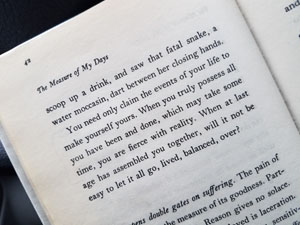Spoiler Alert: For those of you who do not already know this, there is a very, very simple answer to the question of Life, the Universe, and Everything. Remarkably, mind-bogglingly simple.
In The Hitch Hiker’s Guide to the Galaxy, Douglas Adams wrote about Deep Thought, a computer designed solely to answer just that question. And after running its complex program for seven and a half million years, it announced, “with infinite majesty and calm,” that the answer was indeed very, very simple. The answer was 42.
Don’t you feel better now?
“Forty-two!” yelled Loonquawl. “Is that all you’ve got to show for seven and a half million years’ work?”
“I checked it very thoroughly,” said the computer, “and that quite definitely is the answer. I think the problem, to be quite honest with you, is that you’ve never actually known what the question is.”
If you don’t feel better after hearing that, don’t worry. No one else there did either.
I’m not going to take the time to tell you how much I love HHG2G. It’s been my favorite book since 1996 and never seems to lose its charm. (You find another book that clarifies the problems of materialism, capitalism, and organized religion on the first page and doesn’t make anyone angry. Well, very angry, anyway… )
Anyway, as there seems to be no other such succinct answer that makes more sense in light of the human condition, 42 works just fine for me. (Though I did recently read a completely plausible and rational explanation for it, I’m grateful to have spent almost 20 years not knowing it.) So here we are, the human race, continuing to ask, “What is this whole thing about anyway?” and trying our best to cope without exterminating ourselves in the process (though sometimes I wonder about that).
I tend to ask a lot of questions. And my own personal delight is that 42 keeps popping up all over the place, peeking its little pointy-serifed face around corners and grinning at me when I least expect it, hinting at what that unknown question actually is, what this “Life, the Universe, and Everything” is all about anyway. Sometime I think it’s flirting with me. It wants to be noticed, and I try to pay attention.
And so I thought, from time to time, it might be fun to share these things as they pop up. Here’s one:
By somewhat sideways means several years ago, I came across a passage by Florida Scott-Maxwell, a woman I’d previously never heard of, but loved instantly, because of this:
“You need only claim the events of your life to make yourself yours. When you truly possess all you have been and done, which may take some time, you are fierce with reality.”
“Fierce with reality.” Oh, how I love that phrase. Not that you are overly aggressive with some forceful agenda, but just that you are so fully yourself, so aware of who you are, that you are fully alive. I read those words and wrote them down, and they’ve popped back up into my life in a couple of different places over the years. Finally, I managed to track her book down at the library. (It’s called The Measure of My Days—it’s a good book). And I knew it was coming, but when I came to that passage in the book, it struck me again, passionate and fresh. Fierce.
 And guess what page it was on?
And guess what page it was on?
This happens to me all the time. It’s like the universe is giving me clues, like we’re playing a game.
How fortuitous.
